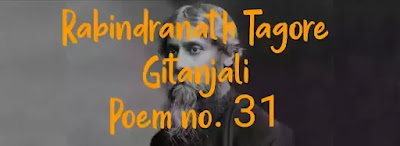Also Read
"Prisoner, tell me, who was it that bound you?"
"It was my master," said the prisoner.
"I thought I could outdo everybody in the world in wealth and power, and I amassed in my own treasure-house the money due to my king. When sleep overcame me I lay upon the bed that was for my lord, and on waking up I found I was a prisoner in my own treasure-house."
"Prisoner, tell me who was it that wrought this unbreakable chain?"
"It was I," said the prisoner, "who forged this chain very carefully. I thought my invincible power would hold the world captive leaving me in a freedom undisturbed. Thus night and day I worked at the chain with huge fires and cruel hard strokes. When at last the work was done and the links were complete and unbreakable, I found that it held me in its grip."
Summary
In this poem the poet again talks about the conflict between the two opposing parts of man. The poet addresses the prisoner, the soul caught within the body and questions him as to who had imprisoned him. And the soul answers that his lord and master God had imprisoned him. He had thought that by amassing great health and power he would be able to excel over all else and others. Therefore, he went and accumulated a lot of wealth and when tired he feel asleep at the place assigned for God and therefore when he woke up he found that God had imprisoned him in a physical body and the physical world.
The poet then questions the imprisoned soul who was it that had made his unbreakable chain that bound the soul. And again the soul answers that he himself had created the chain thinking that with this he would he able to gain greater power and live in unrestricted freedom. He had therefore worked hard in, order to create that chain building huge fires and hard strokes. After having made in strong and unbreakable he found that he himself was bound by this chain.
Critical Analysis
Tagore speaks of the chains that bind and restrict man in this poem. These chains are the worldly wealth, power and possessions that man in his ignorance accumulate and gather. First, he speaks of how man's soul is a prisoner in his own body, a prisoner of his pride and vanity. As he hoards wealth he assumes that the power of this wealth will make him greater than everybody in God's eyes. But this wealth was rightly God's. Moreover, he found that this wealth which he failed to use in the service of God had become chains that bound him. The idea that Tagore conveys through his vivid imagery of a man bounded by strong chains of his own making is that man was meant to serve his spirit, his soul and not just his body and when God finds that man has committed the mistake of confining himself to his worldly and physical needs only rather than attending to the spiritual aspirations of his soul, then God punishes man. Thus, the idea is that though God disposes the punishment, man brought it on himself. Tagore therefore again emphasises in this poem that man needs to free himself from all pride and greed in order to come into God's presence.
Annotations
Prisoner: the soul imprisoned within the body. My Master: God, the supreme being. Amassed: gathered, accumulated. My kind: God. When sleep ....my lord: Man's worldly needs swept his spiritual needs. Unbreakable chain : the strong worldly ties that bound man.
